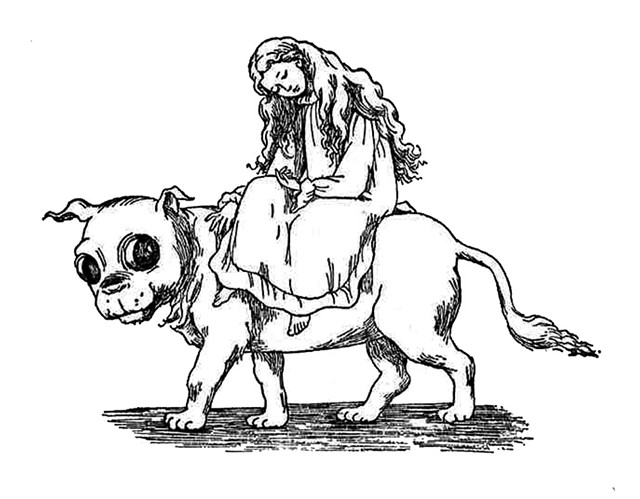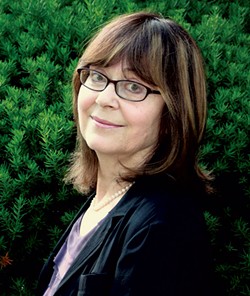
- "The Tinder Box" (Andersen), by Jean O'Neill
At this weekend's Vermont Humanities Council conference at the University of Vermont, the doctor is in — the fairy tale doctor. Harvard University professor Maria Tatar is one of three academically distinguished guests scheduled to speak on the conference theme, "Why Do Stories Matter?"
Officially a professor of Germanic languages and literatures, and former chair of Harvard's folklore and mythology program, Tatar has written extensively on the enduring cultural power of children's stories. That dovetails neatly with this year's Vermont Reads selection, Salman Rushdie's Haroun and the Sea of Stories.
"Once upon a time" is usually shorthand for announcing fantastical, simplistic stories meant for the ears of the very young. Much of Tatar's work, however, seeks to complicate assumptions of fairy tales' inherent innocence. Most recently, she has translated more than 70 lesser-known stories, published as The Turnip Princess and Other Newly Discovered Fairy Tales.
Originally recorded by folklorist Franz Xaver von Schönwerth in the 1800s (a few decades after Wilhelm and Jacob Grimm were working), the tales were drawn from the Regensburg archives in Germany by Erika Eichenseer. Unlike the Grimms, von Schönwerth refrained from "cleaning up" and homogenizing the stories he recorded — The Turnip Princess includes ample gender-bending (like a male Cinderella counterpart and a frog princess), as well as a lot more dung.
Tatar first encountered fairy tales through her older sister. The pair found a beautifully illustrated German book of stories in their home's attic, which the elder sibling used to inspire her versions of the tales — neither of the girls knew German. And that was all, for a long time. "Like many people, I discarded the stories I grew up," Tatar says in a phone conversation with Seven Days. "I didn't think I had much of a nostalgic interest in fairy tales."

- Maria Tatar
Only after Tatar had children of her own did the darkness of certain stories really hit home. She recalls "The Juniper Tree" in particular, in which a stepmother decapitates her stepson and is later killed by a falling millstone. "This is not something you'd want to read to a 3- or 4-year-old," Tatar says.
More significant than their surface-level violence and obscenity, though, is the arena that fairy tales can provide for thinking about complex moral and ethical situations. Tatar identifies "Beauty and the Beast," for example, as contemplating the dividing lines between nature and culture, and asking questions about monstrosity, compassion and encountering "The Other." Tatar references the work of scholar Bruno Bettelheim, a Freudian thinker who argued that the mind of a child is a "seething cauldron of emotion."
"They may look innocent and sweet and peaceful," says Tatar, "but there's a lot going on there. [There's] a lot that they have to work through that they can't put into words."
Given the gravity of the stories' themes, as well as their role in German culture, Tatar was shocked when she discovered that folktales were nowhere to be found in the 20-page reading list of her graduate German literature program. Despite the global reach of that country's folklore, "It wasn't considered worthy of academic analysis at the time," she says.
Perhaps unexpectedly, Tatar is not afraid of folk stories being lost to time and paradigm shifts.
"I don't think we're at all in danger of losing these stories, because they speak to themes that are so central to the human condition," she says. She explains that the Brothers Grimm recorded their fairy tales in large part due to fear that the stories would disappear as industrialization and urbanization took hold, a sea change comparable in magnitude to this century's digital revolution.
"So many major sectors of the economy have just sort of dropped out," says Tatar. "Remember travel agents?" But if the internet has threatened jobs, it's only offered "new portals" for fairy tales, she says. Tatar aligns herself with anthropologist Claude Lévi-Strauss, who believed that every version of a particular story belongs to the cultural legacy — even, she says, something like a Chanel No. 5 commercial that riffs on "Little Red Riding Hood."
"The only way we can kill off a fairy tale is to keep telling the same story over and over again — to not change it," Tatar claims. "The bottom line is, in times of crisis, these stories become more important than ever because we use them to renegotiate our values."
The professor concedes, however, that rural environments may still be somewhat more conducive to perpetuating a robust storytelling culture. "When you have a slightly slower metabolism in the world around you, stories become all the more important for connectivity and community," Tatar notes. "Once things speed up in the way that they do in urban areas, you just have less of an opportunity to use the story as a mode of connection."
At this week's conference, Tatar will deliver two talks: "The Wolf Trap: Entering the Woods Through Fairy tales" on Friday afternoon, and "Telling Lies: Storytelling and Negative Capability" on Saturday morning. The two other speakers are William Cronon, professor of history, geography and environmental studies at the University of Wisconsin-Madison, presenting "The Portage: Time, Memory and Storytelling in the Making of an American Place," and Wendy Doniger, a history of religions professor at the University of Chicago, on "Myth, Reason and Rationality: The Tale of the Clever Wife."









Comments
Comments are closed.
From 2014-2020, Seven Days allowed readers to comment on all stories posted on our website. While we've appreciated the suggestions and insights, right now Seven Days is prioritizing our core mission — producing high-quality, responsible local journalism — over moderating online debates between readers.
To criticize, correct or praise our reporting, please send us a letter to the editor or send us a tip. We’ll check it out and report the results.
Online comments may return when we have better tech tools for managing them. Thanks for reading.